高考英语形容词与副词考点归纳
高考英语复习形容词和副词知识点讲解讲义(必考点)
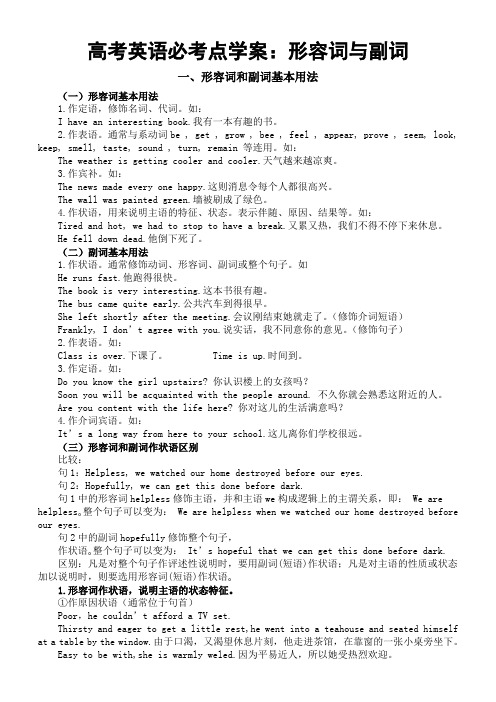
高考英语必考点学案:形容词与副词一、形容词和副词基本用法(一)形容词基本用法1.作定语,修饰名词、代词。
如:I have an interesting book.我有一本有趣的书。
2.作表语。
通常与系动词be , get , grow , bee , feel , appear, prove , seem, look, keep, smell, taste, sound , turn, remain 等连用。
如:The weather is getting cooler and cooler.天气越来越凉爽。
3.作宾补。
如:The news made every one happy.这则消息令每个人都很高兴。
The wall was painted green.墙被刷成了绿色。
4.作状语,用来说明主语的特征、状态。
表示伴随、原因、结果等。
如:Tired and hot, we had to stop to have a break.又累又热,我们不得不停下来休息。
He fell down dead.他倒下死了。
(二)副词基本用法1.作状语。
通常修饰动词、形容词、副词或整个句子。
如He runs fast.他跑得很快。
The book is very interesting.这本书很有趣。
The bus came quite early.公共汽车到得很早。
She left shortly after the meeting.会议刚结束她就走了。
(修饰介词短语)Frankly, I don’t agree with you.说实话,我不同意你的意见。
(修饰句子)2.作表语。
如:Class is over.下课了。
Time is up.时间到。
3.作定语。
如:Do you know the girl upstairs? 你认识楼上的女孩吗?Soon you will be acquainted with the people around. 不久你就会熟悉这附近的人。
(完整版)高考英语形容词与副词考点归纳

B. large
white German C. white large German
• D. German large white
ห้องสมุดไป่ตู้
• 2. ________ students are required to take part in the boat race. (浙江卷)
• A. Ten strong young Chinese B. Ten Chinese strong young C. Chinese ten young strong D. Young strong ten Chinese
• here, there, home, abroad, below等表 示地点或方位的词及today, tomorrow, yesterday, back, out等表示时间或动词 方向词还可以作定语。如:
• Tom isn’t here. (here作表语)
• The people there were very kind to us. (副词there作定语,修饰people)
• A. so well
B. so good
• C. well enough D. good enough
• 2. If I had ________, I’d visit Europe, stopping at the small interesting places.
• A. a long enough holiday B. an enough long holiday C. a holiday enough long D. a long holiday enough
• A.形容词短语作定语时要后置。
• ________ to take this adventure course will certainly learn a lot of useful skills.
高考英语语法必考:形容词和副词
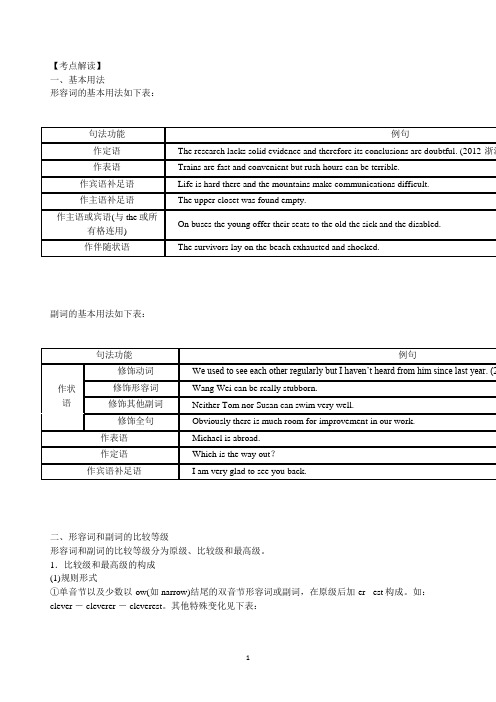
【考点解读】一、基本用法形容词的基本用法如下表:副词的基本用法如下表:二、形容词和副词的比较等级形容词和副词的比较等级分为原级、比较级和最高级。
1.比较级和最高级的构成(1)规则形式①单音节以及少数以-ow(如narrow)结尾的双音节形容词或副词,在原级后加-er -est构成。
如:clever - cleverer - cleverest。
其他特殊变化见下表:②多音节和部分双音节形容词和副词,在原级前加more most构成。
active - more active - most activehappily - more happily - most happily(2)不规则形式good/well - better - bestfar - farther/further - farthest/furthestbad /ill /badly - worse - worstold - older/elder -oldest/eldestmany/much - more - mostlittle - less - least2.基本用法(1)两者相比(甲=乙),用“as+原级+as”表示。
For cheerleaders their sport is just as serious as baxxxxseball or football.【温馨提示】在同等比较级中,若同时出现形容词修饰单数可数名词,其语序为:as+adj.+a+n.+as。
I have never had as boring a day as today.(2)两者相比(甲<乙),用“not as/so+原级+as”表示。
Unfortunately my wife isn’t so fond of them as I am.(3)两者相比(甲>乙),用“比较级+than”表示,(甲<乙)用“less+原级+than”表示。
高考英语形容词和副词专题讲解及高频考点分析
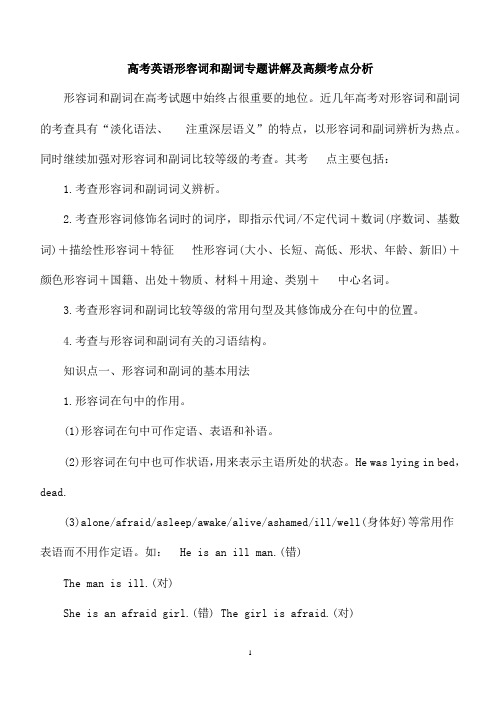
高考英语形容词和副词专题讲解及高频考点分析形容词和副词在高考试题中始终占很重要的地位。
近几年高考对形容词和副词的考查具有“淡化语法、注重深层语义”的特点,以形容词和副词辨析为热点。
同时继续加强对形容词和副词比较等级的考查。
其考点主要包括:1.考查形容词和副词词义辨析。
2.考查形容词修饰名词时的词序,即指示代词/不定代词+数词(序数词、基数词)+描绘性形容词+特征性形容词(大小、长短、高低、形状、年龄、新旧)+颜色形容词+国籍、出处+物质、材料+用途、类别+中心名词。
3.考查形容词和副词比较等级的常用句型及其修饰成分在句中的位置。
4.考查与形容词和副词有关的习语结构。
知识点一、形容词和副词的基本用法1.形容词在句中的作用。
(1)形容词在句中可作定语、表语和补语。
(2)形容词在句中也可作状语,用来表示主语所处的状态。
He was lying in bed,dead.(3)alone/afraid/asleep/awake/alive/ashamed/ill/well(身体好)等常用作表语而不用作定语。
如: He is an ill man.(错)The man is ill.(对)She is an afraid girl.(错) The girl is afraid.(对)(4)two?year?old/200?metre?long/one?thousand?word 等复合形容词中的名词要用单数,一般只用作前置定语。
如:Tom is a two?year?old boy.2.副词在句中的作用。
副词在句中一般用作状语,修饰动词、形容词或其他副词,也可修饰整个句子。
如:Obviously you are wrong.知识点二、常用连接性副词的用法1.though 用作副词时,常在句末,意为“然而,可是”,表示转折意义。
2.therefore“ 因此,所以”,表示结果。
3.meanwhile“与此同时,在此期间”,表示前后分句的动作同时发生。
形容词与副词高考热点归纳

C teb t r .h et e
D. e e l vr w l y
【 例 2 O etobo sti oei 典 】 fh ok ~ s n t w h s
A.a t n r hine C. het nn r t hi e B.t hi e t he t nn s D.at i ne t h n s
— — 一
n i b r h a o et dsu stepo lm. 2 1  ̄ 湖 北 eg o oh d c m i s h rbe (0 2 h w o c 省 高考 题 )
A.t na ie y e ttv l B.t ug te sy ho hl s l
【 例 1 Atog eddnt nw B s nw l h a e 典 】 l uhh i o o ot e , em d h k o l
hi y swa
— — — — — — —
t t e Ho r l i i g o h meCi eBul n . c d B. i c l d f ut i f D. i c l y df ut i f l
t i o hs
A . te bet r B. s be t
. 2 1 (0 2
【 例 1 .ehp ene osn o D . mi e 年 全 国卷I高考 题 1 典 】P rasw edt edfr r S t t se ‘ ho I
w a a o a o ti ” F t e u g se h twe c n d b u t , ah r s g e td
◎ 编闵 /a83 责 i 16r 易 笔 mn@ 硌  ̄n 1o f c n
考 点 一 : 容 词 与 副 词 区 别 形
形容词和副词的知识点归纳英语

形容词和副词的知识点归纳英语一、形容词。
1. 定义与作用。
- 形容词主要用来修饰名词,表示人或事物的性质、状态和特征等。
例如:a beautiful flower(美丽的花朵),“beautiful”描述了“flower”的特征。
2. 形容词的位置。
- 前置修饰:一般放在所修饰的名词之前。
如:a tall boy(一个高个男孩)。
- 后置修饰:- 当修饰不定代词时,形容词后置。
例如:something interesting(有趣的事情)。
- 在一些固定结构中,如“the +形容词”表示一类人时,形容词后置。
例如:the old(老人),the young(年轻人)。
3. 形容词的比较级和最高级。
- 比较级的构成。
- 一般在形容词词尾加 -er。
例如:tall - taller。
- 以e结尾的形容词,直接加 -r。
如:nice - nicer。
- 重读闭音节,双写尾字母再加 -er。
例如:big - bigger。
- 以“辅音字母 + y”结尾的形容词,把y变为i再加 -er。
如:heavy - heavier。
- 不规则变化:good/well - better,bad/badly - worse,many/much - more 等。
- 最高级的构成。
- 一般在形容词词尾加 -est。
例如:tall - tallest。
- 以e结尾的形容词,直接加 -st。
如:nice - nicest。
- 重读闭音节,双写尾字母再加 -est。
例如:big - biggest。
- 以“辅音字母 + y”结尾的形容词,把y变为i再加 -est。
如:heavy - heaviest。
- 不规则变化:good/well - best,bad/badly - worst,many/much - most 等。
- 比较级和最高级的用法。
- 比较级用于两者之间的比较,常用结构有:A+be+形容词比较级+than + B。
高中英语高考复习形容词和副词语法总结
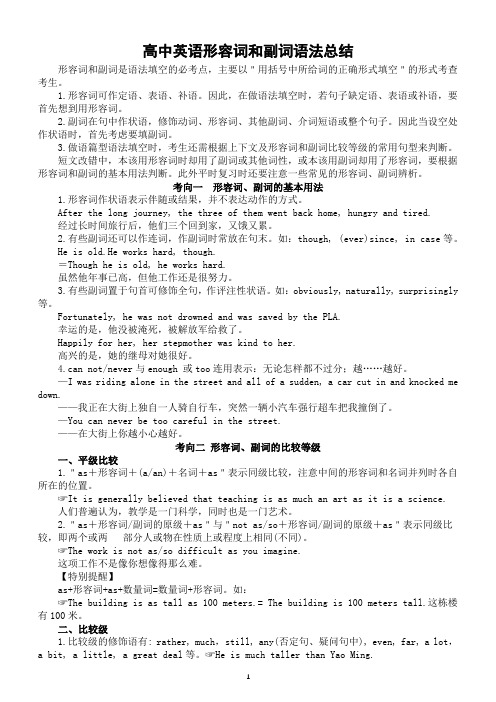
高中英语形容词和副词语法总结形容词和副词是语法填空的必考点,主要以"用括号中所给词的正确形式填空"的形式考查考生。
1.形容词可作定语、表语、补语。
因此,在做语法填空时,若句子缺定语、表语或补语,要首先想到用形容词。
2.副词在句中作状语,修饰动词、形容词、其他副词、介词短语或整个句子。
因此当设空处作状语时,首先考虑要填副词。
3.做语篇型语法填空时,考生还需根据上下文及形容词和副词比较等级的常用句型来判断。
短文改错中,本该用形容词时却用了副词或其他词性,或本该用副词却用了形容词,要根据形容词和副词的基本用法判断。
此外平时复习时还要注意一些常见的形容词、副词辨析。
考向一形容词、副词的基本用法1.形容词作状语表示伴随或结果,并不表达动作的方式。
After the long journey, the three of them went back home, hungry and tired.经过长时间旅行后,他们三个回到家,又饿又累。
2.有些副词还可以作连词,作副词时常放在句末。
如:though, (ever)since, in case等。
He is old.He works hard, though.=Though he is old, he works hard.虽然他年事已高,但他工作还是很努力。
3.有些副词置于句首可修饰全句,作评注性状语。
如:obviously, naturally, surprisingly 等。
Fortunately, he was not drowned and was saved by the PLA.幸运的是,他没被淹死,被解放军给救了。
Happily for her, her stepmother was kind to her.高兴的是,她的继母对她很好。
4.can not/never与enough 或too连用表示:无论怎样都不过分;越……越好。
—I was riding alone in the street and all of a sudden, a car cut in and knocked me down.——我正在大街上独自一人骑自行车,突然一辆小汽车强行超车把我撞倒了。
高考英语语法之形容词和副词

高考英语语法之形容词和副词第一部分考点精讲精练第1讲比较级考点1.可以修饰比较级的词常用来修饰比较级的词或短语有:a bit, a little, rather, much, far, by far, many, a lot, a great deal, any, still, even等。
by far的用法:用于强调,意为“……得多” “最最……” “显然”等,可修饰形容词或副词的比较级和最高级,通常置于其后,但是若比较级或最高级前有冠词,则可置于其前或其后。
如:It’s quicke r by far to go by train. 乘火车要快得多。
She ran fastest by far. 她跑得最快(显然她跑得最快)。
He’s by far the cleverer student.他是个聪明得多的孩子。
He is by far the best teacher.=He is the best teacher by far.他是最最好的老师(或他显然是最好的老师)。
1.You are such a woman as always think ____ ofyourself than others.A. muchB. much moreC. littleD. much less2.【2004福建】The number of people present at theconcert was _____than expected. There were many ticket left.A. much smallerB. much moreC. much largerD. many more3.-The novel is, I have to say, not a bit interesting,How do you find it?-Why! It’s ____________ that I have ever read.A. a most interestingB. a more interestedC. a less interestingD. by far the most interesting4.【2007 全国II】After two years’ research, we no whave a ____ better understanding of the disease.A. veryB. farC. fairlyD. quite 5.------ The disease he suffers is not easy to cure.------ I know, but is he _____ better?A. muchB. ratherC. anyD. little6.【2000上海】You're standing too near the camera.Can you move ______ ?A. a bit farB. a little fartherC. a bit of fartherD. a little far7.【2006江苏】I wish you’d do ________ talking andsome more work. Thus things will become better.A. a bit lessB. any lessC. much moreD. a little more考点2.more 、much与比较级more 和多音节形容词和副词一起构成比较级,如more interesting, more exciting单音节词和部分双音节词在后面加-er构成比较级. 如:taller, earlier, hottermuch修饰比较级。
高考英语形容词与副词考点归纳
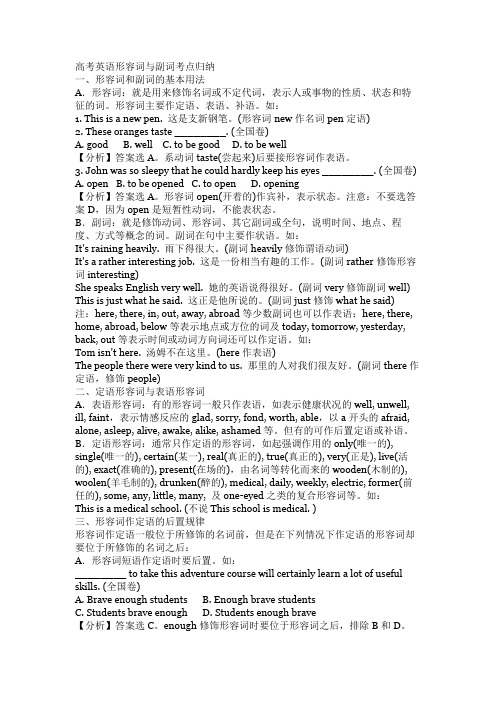
高考英语形容词与副词考点归纳一、形容词和副词的基本用法A.形容词:就是用来修饰名词或不定代词,表示人或事物的性质、状态和特征的词。
形容词主要作定语、表语、补语。
如:1. This is a new pen. 这是支新钢笔。
(形容词new作名词pen定语)2. These oranges taste ________. (全国卷)A. goodB. wellC. to be goodD. to be well【分析】答案选A。
系动词taste(尝起来)后要接形容词作表语。
3. John was so sleepy that he could hardly keep his eyes ________. (全国卷)A. openB. to be openedC. to openD. opening【分析】答案选A。
形容词open(开着的)作宾补,表示状态。
注意:不要选答案D,因为open是短暂性动词,不能表状态。
B.副词:就是修饰动词、形容词、其它副词或全句,说明时间、地点、程度、方式等概念的词。
副词在句中主要作状语。
如:It's raining heavily. 雨下得很大。
(副词heavily修饰谓语动词)It's a rather interesting job. 这是一份相当有趣的工作。
(副词rather修饰形容词interesting)She speaks English very well. 她的英语说得很好。
(副词very修饰副词well) This is just what he said. 这正是他所说的。
(副词just修饰what he said)注:here, there, in, out, away, abroad等少数副词也可以作表语;here, there, home, abroad, below等表示地点或方位的词及today, tomorrow, yesterday, back, out等表示时间或动词方向词还可以作定语。
高考英语形容词和副词考点总结。

高考英语:形容词和副词【考查要点】1) 原级,比较级、最高级的选用及应用范围,复习中须注意如下句型的用法:①as + 原级adj. / adv. + as表“和…一样”;not as / so + 原级adj. / adv. + as表“不如…”。
例如:John plays football as well as David. Tom does not play the piano so/as well as Jack.The violin in the other shop will be cheaper, but not as good.②as + 原级adj. + a(n) + n. + as表“跟…一样”。
如It’s believed that teaching is as much an art as it is a science. Our neighbor has as big a house as ours.③比较级+ than表“比…更”;less+原级+ than表“不如…”。
如:This year they have produced less grain than they did last year. This road is wider than that one.④the + 比较级,the + 比较级表示“越…,就会越…”。
例如:It’s believed that the harder you work, the better result you’ll get.⑤the +比较级+ of the + two/名词/代词表两者中“较…的一个”。
如:Who is the younger of the two boys?⑥比较级+and+ 比较级表示:越来越…。
如:Our country is getting stronger and stronger.⑦用the last表示“最不可能的”、“最不适合的”、“最不希望的”等。
高考英语形容词和副词三十大核心考点
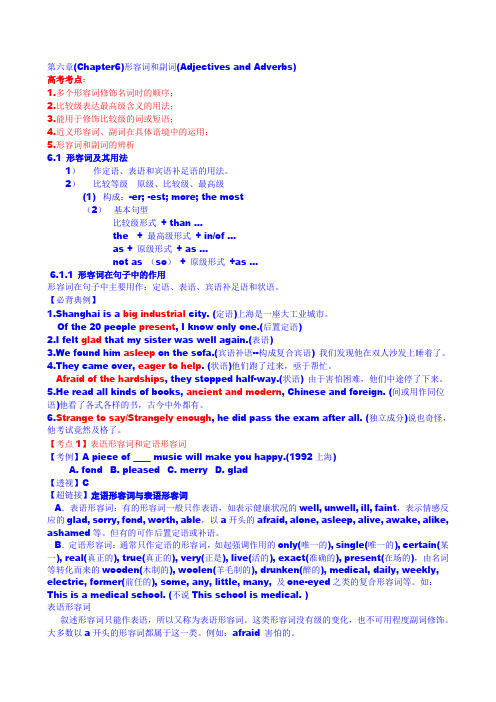
第六章(Chapter6)形容词和副词(Adjectives and Adverbs)高考考点:1.多个形容词修饰名词时的顺序;2.比较级表达最高级含义的用法;3.能用于修饰比较级的词或短语;4.近义形容词、副词在具体语境中的运用;5.形容词和副词的辨析6.1 形容词及其用法1)作定语、表语和宾语补足语的用法。
2)比较等级原级、比较级、最高级(1) 构成:-er; -est; more; the most(2)基本句型比较级形式+ than …the+ 最高级形式+ in/of …as + 原级形式+ as …not as (so)+ 原级形式+as …6.1.1 形容词在句子中的作用形容词在句子中主要用作:定语、表语、宾语补足语和状语。
【必背典例】1.Shanghai is a big industrial city. (定语)上海是一座大工业城市。
Of the 20 people present, I know only one.(后置定语)2.I felt glad that my sister was well again.(表语)3.We found him asleep on the sofa.(宾语补语--构成复合宾语) 我们发现他在双人沙发上睡着了。
4.They came over, eager to help. (状语)他们跑了过来,亟于帮忙。
Afraid of the hardships, they stopped half-way.(状语) 由于害怕困难,他们中途停了下来。
5.He read all kinds of books, ancient and modern, Chinese and foreign. (间或用作同位语)他看了各式各样的书,古今中外都有。
6.Strange to say/Strangely enough, he did pass the exam after all. (独立成分)说也奇怪,他考试竟然及格了。
高考英语语法知识总结形容词和副词
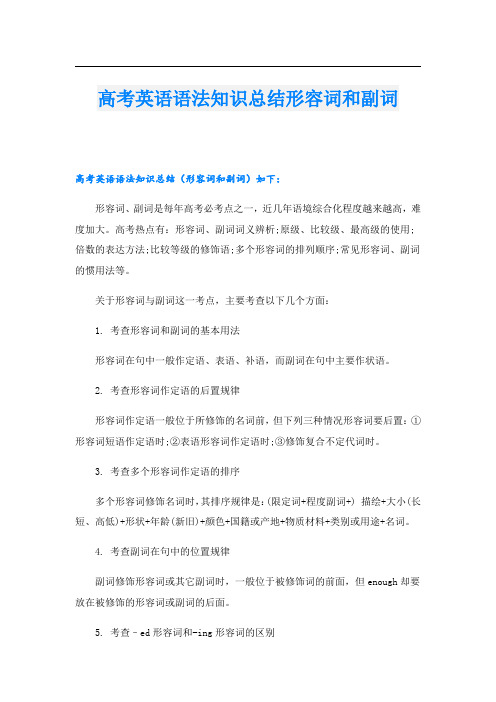
高考英语语法知识总结形容词和副词高考英语语法知识总结(形容词和副词)如下:形容词、副词是每年高考必考点之一,近几年语境综合化程度越来越高,难度加大。
高考热点有:形容词、副词词义辨析;原级、比较级、最高级的使用;倍数的表达方法;比较等级的修饰语;多个形容词的排列顺序;常见形容词、副词的惯用法等。
关于形容词与副词这一考点,主要考查以下几个方面:1. 考查形容词和副词的基本用法形容词在句中一般作定语、表语、补语,而副词在句中主要作状语。
2. 考查形容词作定语的后置规律形容词作定语一般位于所修饰的名词前,但下列三种情况形容词要后置:①形容词短语作定语时;②表语形容词作定语时;③修饰复合不定代词时。
3. 考查多个形容词作定语的排序多个形容词修饰名词时,其排序规律是:(限定词+程度副词+) 描绘+大小(长短、高低)+形状+年龄(新旧)+颜色+国籍或产地+物质材料+类别或用途+名词。
4. 考查副词在句中的位置规律副词修饰形容词或其它副词时,一般位于被修饰词的前面,但enough却要放在被修饰的形容词或副词的后面。
5. 考查–ed形容词和-ing形容词的区别-ed形容词,通常说明人,意为“(某人)感到……”;-ing形容词通常说明事物,意为“(某事物)令人……”或“令人……的(事物)”。
6. 考查两种不同形式的副词的用法差异即考查与形容词同形的副词与形容词后加ly构成的副词的区别。
7. 考查形容词和副词的比较等级。
8. 考查比较等级的修饰语。
考点1:在具体的语境中辨析形容词与副词的语义从复现的频率来看,此点是高考对形容词、副词考查的第一大热点。
解答此类题关键是要分析具体的语境,结合基本词义、搭配等来选择正确的答案。
经过统计,常见常考的形容词和副词有(按频度排列):even; interested; interesting; yet; hardly; just; therefore; though; too; very; common; effective; either; ever; fair; however; less; more; nearly; only; purposefully; rather; still; such; surprised; surprising 还有以下形容词和副词应当熟悉和掌握: a good many; a number of; acceptable; accidentally; actively; adequately; already; another; anxious; anyway; ashamed; attentively; bad; badly; besides; better; but; careful; changeable; cheap; comfortable; convenient; eagerly; easy; encouraging; enha-ncing; equal; even though; eventually; fairly; far; fewer; following; formally; friendly; gen-erously; gradually; heavily; historic; hopefully; immediately; inaccessible; individual; inevit-able; initial; instead; invisible; largely; never; next; no; normal; nowadays; obviously; ordin-ary; other; otherwise; patient; plenty of; prac-tical; promoting; proper; quickly; readily; reasonable; remote; seldom; seriously; short; so; stimulating; traditional; unavailable; unav-oidable; unfavorable; unfortunately; usual; va-rious; weak; well考点2:考查形容词、副词的比较级、最高级及前面的修饰语【备考清单】1) 比较级、最高级的选用及应用范围比较级、最高级常用于表示两者或多者间的比较。
高考英语形容词和副词讲解
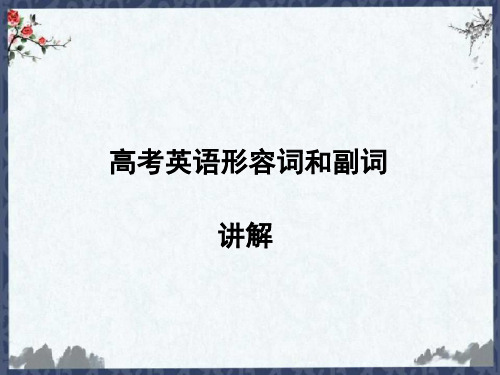
2.-ed形容词通常用于说明人的感受,常译为“感到……的”,强 调人自身的情感波动;修饰事物时,则多修饰air(神态),smile (微笑),feeling (感觉),appearance (容貌),cry (哭声),face (表情),voice (声音),mood (情绪),look (表情),eye (眼神)等 显示某人情感状况的名词。
在下列情况下,形容词要放在被修饰词的后面。 (1)形容词作定语修饰somebody,something,anyone,anything, nobody等复合代词时,需后置。 Is there anything wrong with your car? 你的汽车出什么毛病了吗?
(2)以-able或-ible结尾的形容词可置于由形容词的最高级或all, every,only等词修饰的名词后面。 This is the best computer available. 这是现在可用的最好的一台电脑。 (3)形容词短语作定语要后置。 That is a problem difficult to answer. 那是一个难以回答的问题。 (4)表语形容词(alive,asleep,awake,alike,available等)作定语, 一般要后置。 The girl awake is his younger sister. 那个醒着的女孩是他的妹妹。
填一填
3.present 目前的,现在的;出场的,出席的
目前的形势
在场的雇员
答案 the present situation;the employees present
4.concerned 担心的,焦虑的;有关的,有牵连的
忧心忡忡的医生
(与……事情)有关的医生
答案 the concerned doctor;the doctor concerned
高三英语高考语法知识点归纳总结形容词和副词

用比较级来表达最高级的意思
我从来没有度过这样令人烦恼的一天。 (意为:我度过了最为令人烦恼的一天。 )
表达法一: A is three(four, etc.)times the size(height,
length etc.)of B. The new building is four times the size(the height)of the old one. 这座新楼是那座旧楼的四倍大(高) / 这座新楼比那 座旧楼大(高)三倍。 表达法二: A is three(four, etc.)times as big(high, long,
perfect, superior,junior 等
twice 或 double. 注意: 1. 可以修饰比较级的词有: much, many, a lot, even, far, a bit, a little, still, yet, by far, any,
a great deal;
2. 表示“最高程度“的形容词没有最高级和比较级。如:
favourite, excellent, extreme,
only 修饰的名词之后
the best book available, the only solution possible
alive, alike, awake, aware, asleep 等作定语时后 3
置
the only person awake
4 和空间、时间、单位连用时 5 成对的形容词可以后置
a bridge 50 meters long a huge room simple and beautiful
6 形容词短语一般后置
a man difficult to get on with
高中英语2025届高考语法复习形容词与副词知识讲解
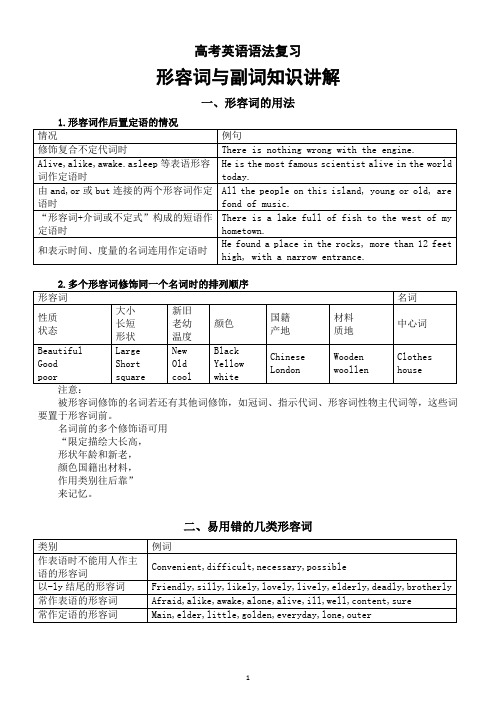
高考英语语法复习
形容词与副词知识讲解
一、形容词的用法
被形容词修饰的名词若还有其他词修饰,如冠词、指示代词、形容词性物主代词等,这些词要置于形容词前。
名词前的多个修饰语可用
“限定描绘大长高,
形状年龄和新老,
颜色国籍出材料,
作用类别往后靠”
来记忆。
二、易用错的几类形容词
三、形容词的比较等级
English is as interesting a subject as Chinese.
Which is the better of the two watches?
She is the taller of the two girls.
other或else把主语排除在比较对象之外;但如果不在同一范围比较则不需要用。
Susan is taller than any girl in her sister’s class.
四、副词的句法功能
五、副词的位置
六、副词比较等级的用法。
高考英语一轮复习复习:形容词与副词的用法总结
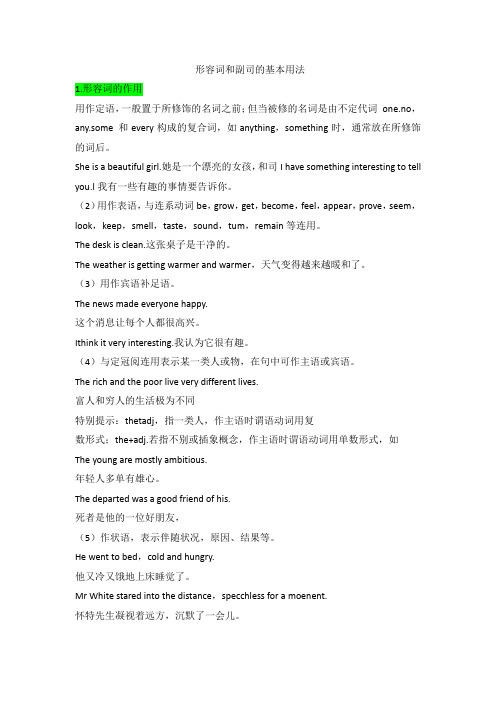
形容词和副司的基本用法1.形容词的作用用作定语,一般置于所修饰的名词之前;但当被修的名词是由不定代词one.no,any.some 和every构成的复合词,如anything,something时,通常放在所修饰的词后。
She is a beautiful girl.她是一个漂亮的女孩,和司I have something interesting to tell you.l我有一些有趣的事情要告诉你。
(2)用作表语,与连系动词be,grow,get,become,feel,appear,prove,seem,look,keep,smell,taste,sound,tum,remain等连用。
The desk is clean.这张桌子是干净的。
The weather is getting warmer and warmer,天气变得越来越暖和了。
(3)用作宾语补足语。
The news made everyone happy.这个消息让每个人都很高兴。
Ithink it very interesting.我认为它很有趣。
(4)与定冠阅连用表示某一类人或物,在句中可作主语或宾语。
The rich and the poor live very different lives.富人和穷人的生活极为不同特别提示:thetadj,指一类人,作主语时谓语动词用复数形式;the+adj.若指不别或插象概念,作主语时谓语动词用单数形式,如The young are mostly ambitious.年轻人多单有雄心。
The departed was a good friend of his.死者是他的一位好朋友,(5)作状语,表示伴随状况,原因、结果等。
He went to bed,cold and hungry.他又冷又饿地上床睡觉了。
Mr White stared into the distance,specchless for a moenent.怀特先生凝视着远方,沉默了一会儿。
高中英语高考语法复习形容词与副词

高考英语形容词与副词一、形容词01 形容词的句法功能02 形容词的位置形容词作定语时一般置于被修饰词前作前置定语,下列情况中形容词通常后置于被修饰词。
(1)修饰something,anybody,nobody,anything等复合不定代词时There is nothing wrong with the machine.(机器什么问题都没有。
)(2)形容词词组作定语时She bought a book suitable for children.(她买了本适合孩子们的图书。
)(3)修饰表示数量的词要后置The baby is only five months old.(这个婴儿仅有五个月大。
)(4)enough作形容词修饰名词时,一般放在名词之前,也可放在名词之后We don't bring enough money.(我们没带够钱。
)There‘ll be time enough to relax when you’ve finished your work.(你完成工作后会有足够的时间来放松。
)[注]形容词常见于定语位置和表语位置,以上只列出几种常见情况讲解。
具体位置要视具体形容词及句子而定。
03 多个形容词修饰名词时的语序按以下顺序排列:(1)限定词(a/an,the,this,his,first,one...)(2)表示特征或性质等描述性形容词(good,pretty...)(3)表示大小、长短、高低的形容词(big,long,little...)(4)表示形状的形容词(round,square...)(5)表示年龄、新旧的形容词(old,young,new...)(6)表示颜色的形容词(red,yellow...)(7)表示国籍、地区、出处的形容词(America,southern,Italian...)(8)表示物质材料的形容词(wooden,woollen,glass...)(9)表示用途、类别的形容词(medical,writing...)a beautiful large green Chinese carpet一块漂亮宽大的绿色的中国地毯the first three days 头三天enormous black iron gates 巨大的黑色铁门04 形容词的特殊用法二、副词01 副词的种类根据词义可分为:(1)时间副词yesterday(昨天),today(今天),now(现在)等。
高考英语形容词副词复习

by Jessie
考点一
•形容词和副词的基本用法
一、形容词的基本用法
• 1. These are valuable suggestions. • 2. He is the happiest person alive. • 3. Do you have anything important to tell me? • 4. His suggestions are very valuable. • 5. I consider his suggestion very valuable. • 6. He returned home, safe and sound. • 7. He is standing there, full of fear.
• 2. It is very late. I will come back as soon as _________. • 3. It is _____________________that they will meet with some
opposition.
4. ever, once
• 疑问句、否定句、比较结构或带 if的句子中,完成时 • I don't think I've ever been here before. • If you're ever in Seatle, come and see me.
came to the party.
• You can find the meaning of
word here.
• ② 否定词not可放在 nearly之前,构成 not nearly结构,意为“一点 也不,相关甚远”,但没有not almost.
system.
- 1、下载文档前请自行甄别文档内容的完整性,平台不提供额外的编辑、内容补充、找答案等附加服务。
- 2、"仅部分预览"的文档,不可在线预览部分如存在完整性等问题,可反馈申请退款(可完整预览的文档不适用该条件!)。
- 3、如文档侵犯您的权益,请联系客服反馈,我们会尽快为您处理(人工客服工作时间:9:00-18:30)。
高考英语形容词与副词考点归纳一、形容词和副词的基本用法A.形容词:就是用来修饰名词或不定代词,表示人或事物的性质、状态和特征的词。
形容词主要作定语、表语、补语。
如:1. This is a new pen. 这是支新钢笔。
(形容词new作名词pen定语)2. These oranges taste ________. (全国卷)A. goodB. wellC. to be goodD. to be well【分析】答案选A。
系动词taste(尝起来)后要接形容词作表语。
3. John was so sleepy that he could hardly keep his eyes ________. (全国卷)A. openB. to be openedC. to openD. opening【分析】答案选A。
形容词open(开着的)作宾补,表示状态。
注意:不要选答案D,因为open是短暂性动词,不能表状态。
B.副词:就是修饰动词、形容词、其它副词或全句,说明时间、地点、程度、方式等概念的词。
副词在句中主要作状语。
如:It’s raining heavily. 雨下得很大。
(副词heavily修饰谓语动词)It’s a rather interesting job. 这是一份相当有趣的工作。
(副词rather修饰形容词interesting) She speaks English very well. 她的英语说得很好。
(副词very修饰副词well)This is just what he said. 这正是他所说的。
(副词just修饰what he said)注:here, there, in, out, away, abroad等少数副词也可以作表语;here, there, home, abroad, below等表示地点或方位的词及today, tomorrow, yesterday, back, out等表示时间或动词方向词还可以作定语。
如:Tom isn’t here. 汤姆不在这里。
(here作表语)The people there were very kind to us. 那里的人对我们很友好。
(副词there作定语,修饰people)二、定语形容词与表语形容词A.表语形容词:有的形容词一般只作表语,如表示健康状况的well, unwell, ill, faint,表示情感反应的glad, sorry, fond, worth, able,以a开头的afraid, alone, asleep, alive, awake, alike, ashamed等。
但有的可作后置定语或补语。
B.定语形容词:通常只作定语的形容词,如起强调作用的only(唯一的), single(唯一的), certain(某一), real(真正的), true(真正的), very(正是), live(活的), exact(准确的), present(在场的),由名词等转化而来的wooden(木制的), woolen(羊毛制的), drunken(醉的), medical, daily, weekly, electric, former(前任的), some, any, little, many, 及one-eyed之类的复合形容词等。
如:This is a medical school. (不说This school is medical. )三、形容词作定语的后置规律形容词作定语一般位于所修饰的名词前,但是在下列情况下作定语的形容词却要位于所修饰的名词之后:A.形容词短语作定语时要后置。
如:________ to take this adventure course will certainly learn a lot of useful skills. (全国卷)A. Brave enough studentsB. Enough brave studentsC. Students brave enoughD. Students enough brave【分析】答案选C。
enough修饰形容词时要位于形容词之后,排除B和D。
brave enough to…是形容词短语作定语,修饰students,要置于名词students之后。
B.表语形容词作定语要后置。
如:All the people ________ at the party were his supporters. (北京卷)A. presentB. thankfulC. interestedD. important【分析】答案选A。
表语形容词present(出席的、在场的)作定语,要放在所修饰的名词后。
C.形容词修饰不定代词something, anything, nothing等时,要位于后面。
如:Is there anything important in the paper? 报纸上有什么重要新闻吗?四、多个形容词作定语的排序多个形容词修饰名词时,其排序规律是:(限定词+程度副词+) 描绘性形容词+表示大小(长短、高低)、形状、年龄(新旧)的形容词+表颜色的形容词+表国籍或产地的形容词+表物质材料的形容词+表类别或用途的形容词+名词。
如:1. John Smith, a successful businessman, has a ________ car. (辽宁卷)A. large German whiteB. large white GermanC. white large GermanD. German large white【分析】答案选B。
按“大小+颜色+产地”的顺序排列。
2. ________ students are required to take part in the boat race. (浙江卷)A. Ten strong young ChineseB. Ten Chinese strong youngC. Chinese ten young strongD. Young strong ten Chinese【分析】答案选A。
数词是限定词,应排在形容词前,排除C和D;又strong是描绘,young是年龄,Chinese是国籍,其先后应为“描绘+年龄+国籍”。
3. The ________ house smells as if it hasn’t been lived in for years. (江苏卷)A. little white woodenB. little wooden whiteC. white wooden littleD. wooden white little【分析】答案选A。
little是限定词,应放在形容词前面,排除C和D;表示颜色的应放在表示物质材料的形容词的前面,排除B。
注:限定词的排序:前位限定词(指量限定词all, both, half等;倍数词double, twice等;分数词one-third, two-fifths等) +中位限定词(冠词;指示代词;形容词性物主代词;名词所有格)+后位限定词(序数词及last, next等;基数词及few, several等)。
如:1. The husband gave his wife ________ every month in order to please her. (重庆卷)A. all half his incomeB. his half all incomeC. half his all incomeD. all his half income【分析】答案选A。
all和half都是前位限定词,his是中位限定词,所以his要位于all 和half之后,只有A正确。
2. —How was your recent visit to Qingdao?—It was great. We visited some friends, and spent the ________ days at the seaside. (全国卷)A. few last sunnyB. last few sunnyC. last sunny fewD. few sunny last【分析】答案选B。
last, few是限定词,sunny是描绘性形容词,根据“限定词+形容词”的原则,排除C和D。
又根据“序数词(包括last, past, next, another等)+基数词(包括few, several 等)”的原则,排除A。
五、副词在句中的位置规律1) 副词修饰形容词或其它副词时,一般位于被修饰词的前面,但enough却要放在被修饰的形容词或副词的后面。
如:1. —Mum, I think I’m ________ to get back to school.—Not really, my dear. You’d better stay at home for another day or two. (全国卷)A. so wellB. so goodC. well enoughD. good enough【分析】答案选C。
指“身体好”用形容词well (=healthy)而不用good;副词enough修饰形容词时,要位于形容词之后。
2. If I had ________, I’d visit Europe, stopping at the small interesting places. (全国卷)A. a long enough holidayB. an enough long holidayC. a holiday enough longD. a long holiday enough【分析】答案选A。
enough要放在形容词long之后。
3. ________, some famous scientists have the qualities of being both careful and careless. (上海卷)A. Strangely enoughB. Enough strangelyC. Strange enoughD. Enough strange【分析】答案选A。
修饰整个句子,要用副词,排除C和D;副词enough应放在它所修饰的副词strangely的后面,所以选A。
2) 频度副词always, usually, often, never等一般放在行为动词前,或者情态动词、助动词或be动词之后。
如:She always gets up early. 她总是起得早。
